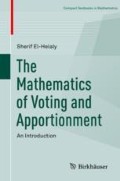Abstract
The shortcomings of the widely used plurality procedure are discussed. Elimination procedures are introduced as attempts to avert the shortcomings of the plurality procedure. The Condorcet tournament (commonly known as the round robin tournament) with its graph representation and related concepts are introduced and special attention is given to the Condorcet paradox and how it can be used in a parliamentary procedure to manipulate the voting outcome by creating a killer amendment. McGarvey’s theorem - which establishes the existence of a scenario of voting that can be represented by any complete directed graph - is presented. The vulnerability of Borda count to the influence of irrelevant alternatives and its frequent failure to elect an existing Condorcet winner are demonstrated. The principe of elimination is brought to the Borda count, thus creating the Hare-Borda procedure which satisfies the Condorcet winner criterion. An introduction of the social welfare theory is presented including the theorems of Duncan Black, Kenneth May, Kenneth Arrow and Allen Gibbard, with complete detailed proofs. The standard social choice procedures and Condorcet’s concepts are adapted to allow ties and indifference in voter’s rankings of the alternatives. The manipulation of such procedure is studied and the theorem of Peter Gärdenfors on the manipulability of social choice functions that satisfy the Condorcet winner criterion in addition to anonymity and neutrality is proven.
Access this chapter
Tax calculation will be finalised at checkout
Purchases are for personal use only
References
Arrow, K.J.: Social Choice and Individual Values, 2nd edn. Yale University, New Haven (1963)
Black, D.: Theory of Committees and Elections. Cambridge University Press, Cambridge (1958)
Fishburn, P.C.: The Theory of Social Choice. Princeton University, Princeton (1973)
Gaertner, W.: A Primer in Social Choice Theory. Oxford University, New York (2006)
Gärdenfors, P.: Manipulation of social choice functions. J. Econ. Theory 13, 217–228 (1976)
Gibbard, A.: Social Choice and the Arrow Conditions. Unpublished Manuscript (1969)
Heckelman, J.C., Miller, N.R. (ed.): Handbook of Social Choice and Voting. Edward Elgar, Cheltenham (2015)
Laslier, J.-F.: Tournament Solutions and Majority Voting. Springer, Berlin (1997)
McGarvey, D.C.: A Theorem on the Construction of Voting Paradoxes. Econometrica 21 (4), 608–610 (1953)
Nitzan, S.: Collective Preference and Choice. Cambridge University, New York (2010)
Nurmi, H.: Comparing Voting Systems. D. Reidel, Boston (1987)
Riker, W.H.: Liberalism Against Populism. Waveland, Long Grove (1982)
Schwartz, T.: The Logic of Collective Choice. Columbia University, New York (1986)
Sen, A.: A possibility theorem on majority decision. Econometrica 34, 491–496 (1966)
Suzumura, K.: Rational Choice, Collective Decisions, and Social Welfare. Cambridge University, London (1983)
Taylor, A.: Mathematics and Politics. Springer, New York (1995)
Author information
Authors and Affiliations
Rights and permissions
Copyright information
© 2019 Springer Nature Switzerland AG
About this chapter
Cite this chapter
El-Helaly, S. (2019). Social Choice. In: The Mathematics of Voting and Apportionment. Compact Textbooks in Mathematics. Birkhäuser, Cham. https://doi.org/10.1007/978-3-030-14768-6_1
Download citation
DOI: https://doi.org/10.1007/978-3-030-14768-6_1
Published:
Publisher Name: Birkhäuser, Cham
Print ISBN: 978-3-030-14767-9
Online ISBN: 978-3-030-14768-6
eBook Packages: Mathematics and StatisticsMathematics and Statistics (R0)

